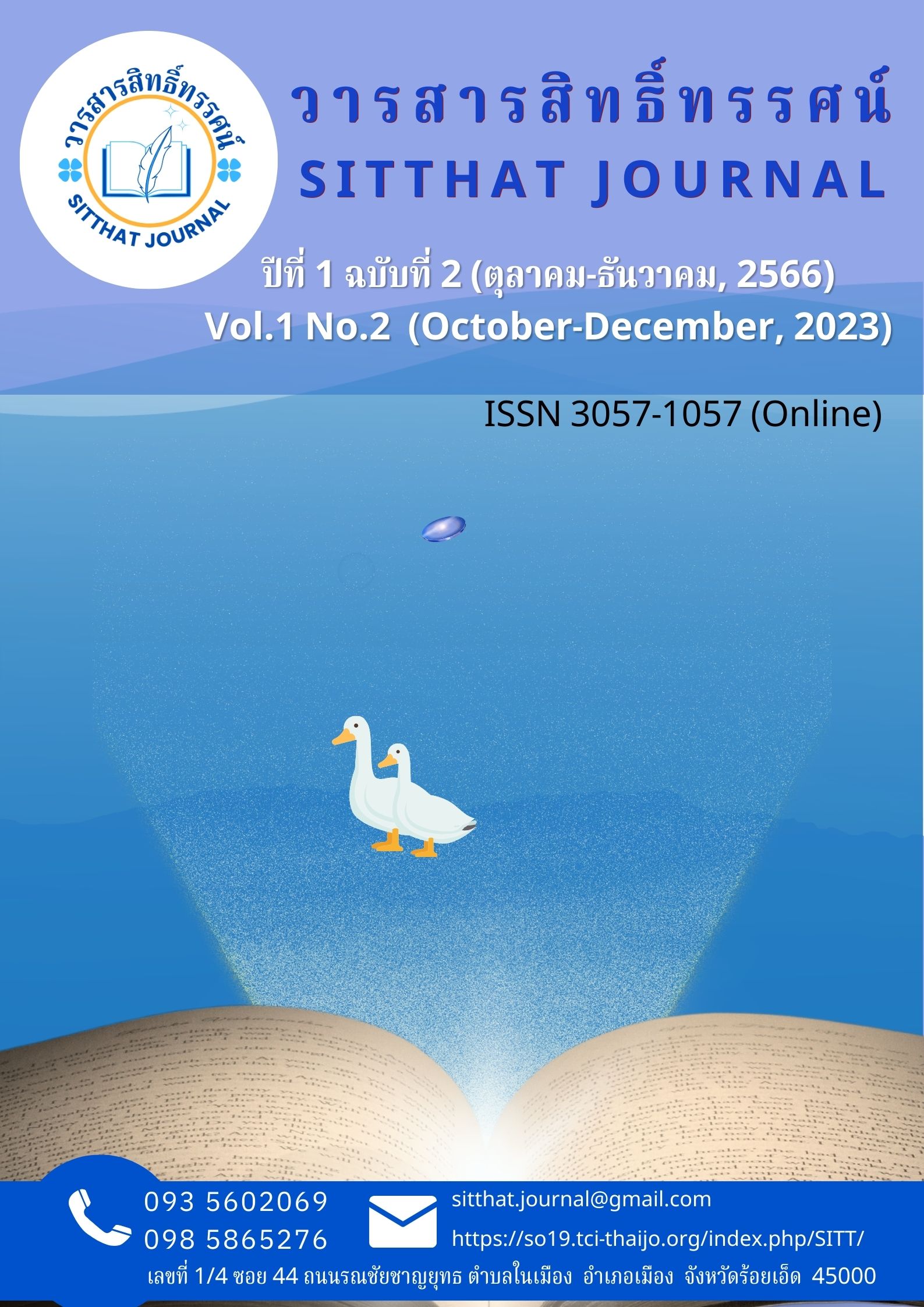USING THE 4 PRINCIPLES OF SECULAR DHAMMA TO SOLVE CONFLICT PROBLEMS IN KHOK SUNG SUBDISTRICT MUEANG DISTRICT, CHAIYAPHUM PROVINCE
Main Article Content
Abstract
The objectives of this research are (1) to study the use of the 4 principles of Seculardhamma to resolve conflicts, (2) to study factors affecting the use of the 4 principles of Seculardhamma to resolve conflicts, and (3) to study the guidelines Using the 4 principles of Secular Dhamma to solve conflict problems in Khok Sung Subdistrict, Mueang District, Chaiyaphum Province The sample group consisted of 359 people who were eligible to vote in Khok Sung Subdistrict, Mueang District, and Chaiyaphum Province The target group includes administrators, civil servants, and community leaders in Khok Sung Subdistrict, Ammuang District, Chaiyaphum Province, totaling 10 people. It is a quantitative research and qualitative research Statistics using frequency distribution statistics and percentage of respondents Analyzed by presenting in tables using mean statistics and standard deviation multiple regression analysis using sequential variable selection method. Accompanying the discussion of results Data analysis and descriptive analysis the results of the research found that: (1) Using the 4 principles of Secular Dhamma to resolve conflicts. Overall, it is at a moderate level. They can be arranged in descending order as follows: Sacrifice, patience, honesty and self-discipline, respectively (2) Factors affecting the use of the 4 principles of Secular Dhamma to resolve conflicts Statistically significant factors include the relationship conflict factor (X2), the information conflict factor (X4), and the interest conflict factor (X5). The coefficient of the predictor in the raw score (b) is equal to .738. .602 And .237 respectively and (3) it is necessary to have the truth to be respected and trusted by others. Because he is sincere, keeps his word, does not waver, because a person who adheres to the truth will be able to perform his duties effectively in time and be successful. Meetama makes us live together happily with others in society. They do not easily quarrel with each other and know how to avoid all vices. Having patience will avoid deterioration from various causes because you have a strong mind. Steady, patient, tolerant not being intoxicated with various temptations is a guarantee of building your own status and life.
Article Details

This work is licensed under a Creative Commons Attribution-NonCommercial-NoDerivatives 4.0 International License.
บทความนี้
References
กัลยา วานิชย์บัญชา.(2560). การวิเคราะห์สถิติชั้นสูงด้วย SPSS for Window (พิมพ์ครั้งที่ 12). กรุงเทพฯ: ห้างหุ้นส่วนจํากัด สามลดา.
คณะทำงานและคณะอนุกรรมการ. (2557). คู่มือปฏิบัติงานเกี่ยวกับกฎหมาย กฎ ระเบียบ ประกาศ และ
คำสั่งที่เกี่ยวกับพระปริยัติธรรม แผนกสามัญศึกษา. กรุงเทพมหานคร: สำนักงานพระพุทธศาสนา
แห่งชาติ.
ดิลก บุญอิ่ม และพระอธิการสุชาติ จนฺทสโร (สายโรจน์). (2561). ฆราวาสธรรม 4: สูตรการพัฒนาคุณภาพชีวิตตามวิถีพุทธ. วารสารวิทยาลัยสงฆ์นครลำปาง, 7(2), 338 – 352.
พัชราภรณ์ หลักทอง. (2560). สภาพปัญหาและแนวทางจัดการความขัดแย้งในชุมชนของคณะกรรมการศูนย์ยุติธรรมชุมชน ตำบลหนองหาน อำเภอหนองหาน จังหวัดอุดรธานี. งานนิพนธ์หลักสูตร
รัฐประศาสนศาสตรมหาบัณฑิต กลุ่มวชิาการจัดการภาครัฐและภาคเอกชน วิทยาลัยการบริหารรัฐกิจ มหาวิทยาลัยบูรพา.
พระมหายศวิภรณ์ เปมสีโล (ตั้งคำ) และคณะ. (2561). การบูรณาการหลักฆราวาสธรรมกับการปฏิบัติตนของครอบครัวไทยยุคไทยแลนด์ 4.0. วารสารสังคมศาสตร์และมานุษยวิทยาเชิงพุทธ, 3(2), 44 – 62.
พระครูสุตวุฒิคุณ (ญาณวฑฺฒโน สุขหนุน. (2563). ภาวะผู้นำการเปลี่ยนแปลงในไทยแลนด์ 4.0. วารสารบัณฑิตศึกษาปริทรรศน์วิทยาลัยสงฆ์นครสวรรค์, 8(2), 245 – 254.
พระพรหมคุณาภรณ์ (ป.อ. ปยุตฺโต). (2551). พัฒนาคุณภาพชีวิตด้วยจิตวิทยาแบบยั่งยืน, กรุงเทพมหานคร: ธรรมสภา.
สุภัทร รัตนบุรี และคณะ. (2563). การบริหารความขัดแย้ง ประสิทธิผลของสถานศึกษา และแนวทางการบริหารความขัดแย้งเพื่อเพิ่มประสิทธิผลของสถานศึกษาสังกัดสำนักงานส่งเสริมการศึกษานอกระบบและการศึกษาตามอัธยาศัย จังหวัดนครศรีธรรมราช. วารสารสังคมศาสตร์และมานุษยวิทยาเชิง
พุทธ. 5(7), 46 – 60.
Morris, C. (2004). Conflict in Health Care Settings: The Role of Apologies." Part of a workshop on Managing Conflict in Health Care Settings: Principles, Practices, Policies" King Prajadhipok's Institute, Bangkok.
Yamane, Taro. (1973). Statistics an introductory analysis. New York Harper & Row.


